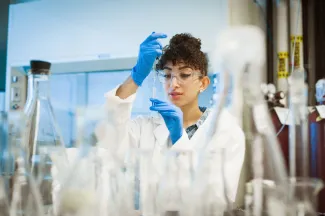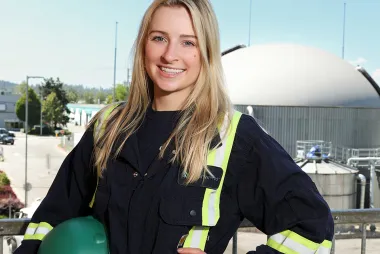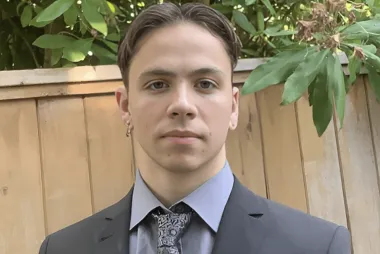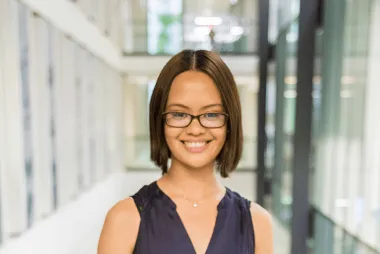You don’t need to have it all figured out. The most important thing is to keep showing up, try new things and learn what drives you.

Jacqueline Mansiere
- Degree:
- Bachelor of Applied Science
- Grad year: 2025
- Program:
- Campus: Vancouver
I grew up in the Okanagan and moved to Vancouver because I was drawn to UBC Chemical & Biological Engineering’s unique blend of problem-solving, innovation, and sustainability.
Throughout my degree, I’ve explored how engineering can drive real-world impact. I’ve completed internships across several industries, including designing a bioreactor and carbon capture system to help a local brewery move toward net-zero emissions, optimizing a recombinant protein bioprocess at a biotech company, and working on water treatment design. I’m currently completing a post-grad internship at Canadian Natural in Calgary, working in the thermal division to help optimize well performance and make operations in the oil and gas sector more sustainable.
Outside the classroom, I’ve always made time to build community. I joined CHBE Council in my third year as VP Academic and served as President for the past two years. I’ve also been a director with the Engineering Undergraduate Society (EUS) and, most recently, Co-President of the UBC chapter of the Society of Petroleum Engineers (SPE).
Outside of work and school, I enjoy hiking, crocheting, and picking up new hobbies just for the fun of learning something new.

Why did you choose chemical engineering?
When I was looking into university programs, I knew I was passionate about sustainability—but I wasn’t exactly sure what I wanted to do with that. What stood out to me about UBC’s Chemical & Biological Engineering program was how many different directions it could take me. Once I started learning more about CHBE, I realized it opened doors in all kinds of industries—whether I wanted to design a specific piece of equipment, develop a full-scale process, or manage an entire project.
I was especially drawn to the balance between low-level engineering, like detailed equipment design, and high-level systems thinking, like designing or optimizing an entire plant. I was also interested in project management, and I learned that chemical engineers often take on leadership roles on interdisciplinary teams because they have a strong understanding of both the overall process and the underlying chemistry and physics.
That versatility really appealed to me. No matter how my interests evolved, I knew CHBE would give me the foundation and flexibility to be part of projects I cared about.
How are you applying the skills you learned through your studies at UBC?
At UBC, I learned how to approach complex problems from both a technical and systems-level perspective—something I’m now applying directly in my internship at Canadian Natural, where I’m working to optimize thermal wells and reduce environmental impact in oil and gas operations.
Skills like process modelling, data analysis, and understanding fluid and heat transfer have been incredibly useful. But beyond the technical knowledge, what’s been most valuable is learning how to think critically under pressure, work across disciplines, and communicate clearly with both engineers and non-engineers.
One of the most useful skills I gained, almost without realizing it, was how to lead and manage teams. Through my roles on CHBE Council, the EUS, and the SPE, I developed confidence in making decisions, setting priorities, and bringing people together around a shared goal. I didn’t expect my engineering degree to teach me so much about leadership and collaboration, but those experiences have become just as important as what I learned in the classroom.
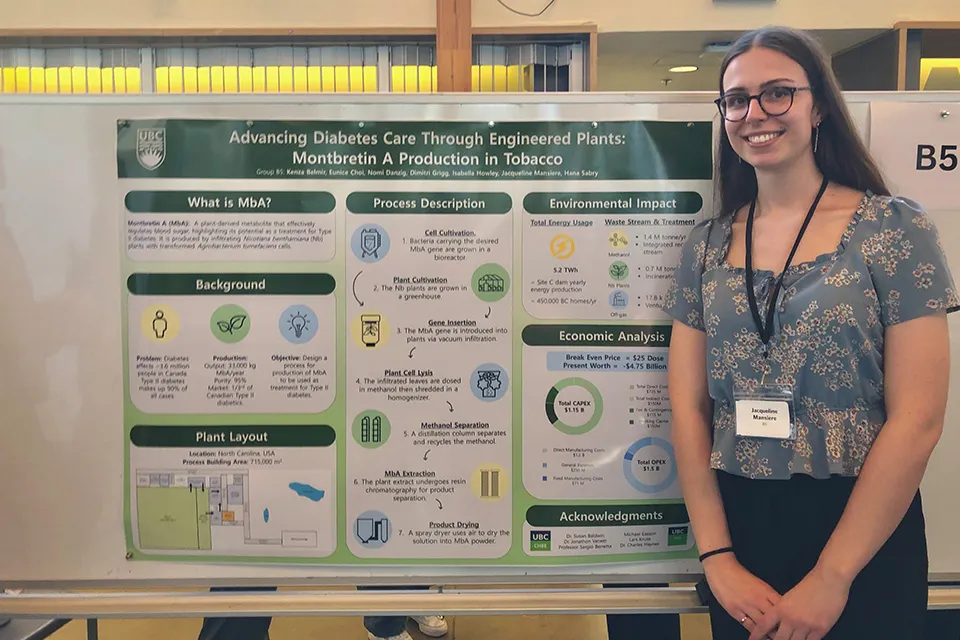
What has made your time at UBC memorable?
What made my time at UBC truly memorable was being part of the CHBE Council and EUS Council. Getting involved in student leadership gave me a sense of connection and purpose beyond the classroom. Some of the most inspiring and supportive people I met during my degree came through these communities, and working alongside them made me feel proud to represent CHBE.
Being on CHBE Council—especially as President—was a huge part of my experience. It gave me the chance to advocate for students, organize events that brought our department closer together, and help create a more engaged and inclusive community. It also taught me how to lead with empathy and confidence, and how to balance a million moving parts while keeping the bigger picture in mind.
Through the EUS, I got to connect with students from across Applied Science and work on larger faculty-wide initiatives. These roles helped shape not just who I am as a student, but the kind of engineer and teammate I want to be. Looking back, the moments I’m most proud of aren’t just technical achievements—they’re the ones where I helped build something meaningful for others.
What advice would you give a student entering CHBE?
The biggest advice I’d give to someone entering CHBE is: you don’t need to have it all figured out at the start. This program opens doors to so many different paths—biotech, energy, water, sustainability, project management, and more—and it's okay if you’re not sure which one is right for you yet. Try different things, say yes to new opportunities, and let your interests evolve.
I wish I had known how much of this degree is about more than just technical skills. Yes, you’ll learn thermodynamics, process design, and optimization—but you’ll also learn how to work on a team, manage a heavy workload, solve open-ended problems, and advocate for yourself and others. One of the most surprising parts of the program for me was how much space there is for leadership and community involvement, and how much those experiences shaped my confidence and growth.
To my younger self, I’d say: don’t be afraid to step outside your comfort zone. The most rewarding parts of my degree came from the moments where I took a risk—even if I wasn’t sure I was ready. That’s how you learn what you’re capable of.
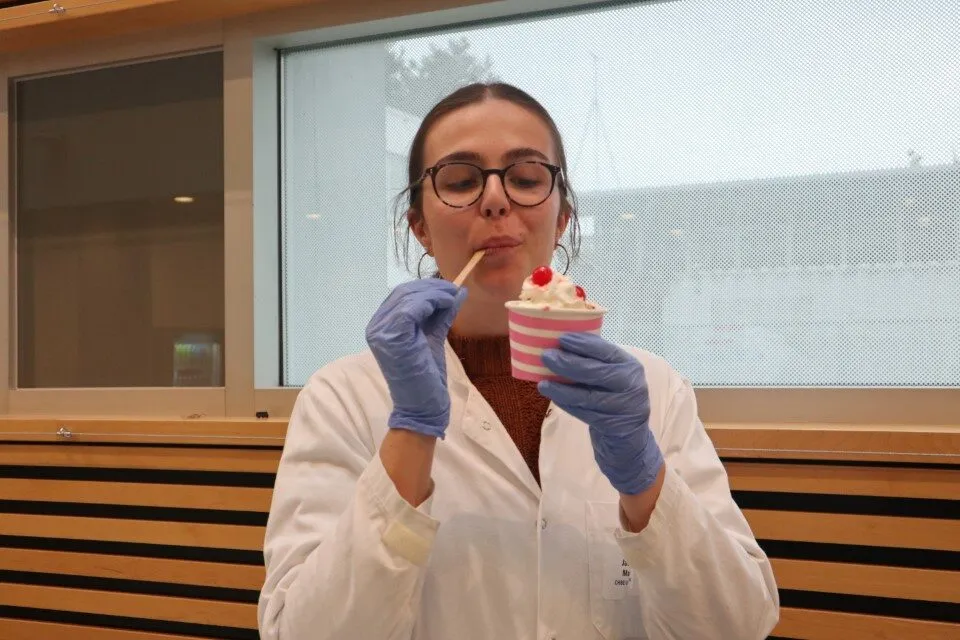
How did your studies in the Faculty of Applied Science prepare you for the future of work?
Chemical and biological engineering is a field that’s constantly evolving—driven by new technologies, sustainability challenges, and shifting global priorities. One of the most valuable things I’ve gained from my time in the Faculty of Applied Science is the ability to stay adaptable. Whether it’s learning to solve unfamiliar problems, working across disciplines, or thinking at both the detail and systems level, my education has taught me how to keep learning and growing no matter what the future brings.
What fuels my passion is the knowledge that engineers have a real opportunity to shape what comes next. At UBC, I’ve learned to approach change with curiosity and confidence. I’ve had the chance to take on leadership roles, work with amazing peers, and explore different aspects of engineering, which showed me that no matter how the field changes I’ll always have the mindset and skills to keep moving forward.
Looking ahead, I want to help lead those changes—whether through innovation, sustainability, or empowering others in the field. I truly believe the foundation I’ve built at UBC will help me contribute to a more responsive, responsible, and future-ready engineering profession.
What is next for you?
I’m doing an internship at Canadian Natural in their thermal division as I explore whether this is where I’d like to begin my Engineer-In-Training (EIT) journey. I’m using this time to learn as much as I can, apply what I’ve studied, and figure out where I want to grow next.
I’m excited to continue learning, not just through formal work experience, but by staying curious and exploring new areas within chemical engineering. Whether it's through new technologies, emerging sustainability practices, or systems optimization, I want to keep expanding my knowledge and skill set. Whatever path I take, I know I want to stay connected to the engineering community. It’s been a huge part of my UBC experience, and I hope to keep contributing through mentorship, leadership, or just being part of the conversations that move our profession forward.

